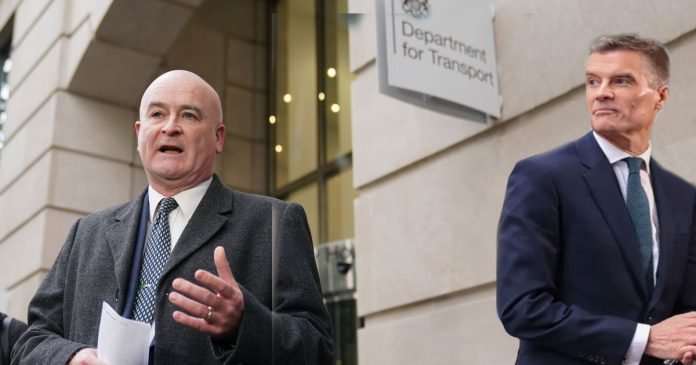
The start of 2023 will bring further stoppages by rail workers, bus drivers, teachers in Scotland, nurses, ambulance workers and civil servants.
Unions are warning of an escalation in their activity. Rishi Sunak’s government is braced for strike ballots for teachers in England and Wales and firefighters to close in January, while junior doctors will also be balloted early in the new year.
Unions are demanding pay rises for their members who are battling soaring inflation. Mick Lynch, head of the RMT, has said the union “will not bow to pressure from the employers and the government to the detriment of our members”.
For RMT, Network Rail has offered a 5pc pay rise this year and 4pc in 2023. The train operating companies said they were waiting for a mandate from the Government for an improved offer.
Strikes will, unfortunately, go ahead due to the government blocking any form of productive negotiations
40,000 workers on Network Rail and 14 train operating companies will take action on 3,4,6 and 7 this week, shutting down most rail services across the country.
Despite the union’s best efforts over the Christmas period, rail employers have not arranged any formal negotiations with RMT to resolve the dispute.
Both Network Rail and the Rail Delivery Group are being directly blocked by government ministers from producing an acceptable proposal on job security, pay and working conditions.
RMT remains available around the clock for talks so all parties can come to a negotiated settlement.
The situation stands in stark contrast to other areas of the railway where the Department for Transport does not have a mandate.
RMT has secured deals with Scotrail, Transport for Wales, contracts on Eurostar and areas where the railway is under the control of metro mayors.
Mick Lynch, RMT general secretary, said: “The government is blocking the union’s attempts to reach a negotiated settlement with the rail employers.
“We have worked with the rail industry to reach successful negotiated settlements ever since privatisation in 1993. And we have achieved deals across the network in 2021 and 2022 where the DfT has no involvement.
“Yet in this dispute, there is an unprecedented level of ministerial interference, which is hamstringing rail employers from being able to negotiate a package of measures with us, so we can settle this dispute.
“We will continue our industrial action campaign while we work towards a negotiated resolution.”
Nationwide train strike dates
- Tuesday, January 3
- Wednesday, January 4
- Thursday, January 5
- Friday, January 6
- Saturday, January 7
On strike days it is expected that just one in five trains will run and nearly all operators will be impacted.
On the days following a strike – so-called “shoulder days” – timetables will be roughly 60pc of normal.
There is also a new overtime and rest day working ban. The railways typically work on the assumption that staff will work overtime and on rest days. A union ban on this could cause further havoc. Train bosses are assessing the impact and will adjust timetables accordingly.
Which train operators are affected?
Nearly every train line will be impacted in some way.
The strikes are by RMT members at Network Rail and across 13 train operators.
- LNER
- Northern trains
- Avanti West Coast
- Southeastern
- Cross Country
- Chiltern Railways
- Greater Anglia
- Govia Thameslink (plus Gatwick Express)
- London Underground
- West Midlands Trains (plus London Northwestern Railway)
- Great Western Railway
- Transpennine Express
The action against the operators is overshadowed by the RMT walkouts at Network Rail – and in particular by signal workers.
Network Rail has reserves of trained signal workers, but only enough to allow 20pc of normal capacity to run.
#SupportRailWorkers#RailStrikes
Support Independent Journalism Today
Our unwavering dedication is to provide you with unbiased news, diverse perspectives, and insightful opinions. We're on a mission to ensure that those in positions of power are held accountable for their actions, but we can't do it alone. Labour Heartlands is primarily funded by me, Paul Knaggs, and by the generous contributions of readers like you. Your donations keep us going and help us uphold the principles of independent journalism. Join us in our quest for truth, transparency, and accountability – donate today and be a part of our mission!
Like everyone else, we're facing challenges, and we need your help to stay online and continue providing crucial journalism. Every contribution, no matter how small, goes a long way in helping us thrive. By becoming one of our donors, you become a vital part of our mission to uncover the truth and uphold the values of democracy.
While we maintain our independence from political affiliations, we stand united against corruption, injustice, and the erosion of free speech, truth, and democracy. We believe in the power of accurate information in a democracy, and we consider facts non-negotiable.
Your support, no matter the amount, can make a significant impact. Together, we can make a difference and continue our journey toward a more informed and just society.
Thank you for supporting Labour Heartlands











